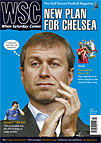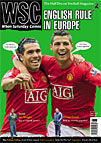 The press are having a field day as Chelsea and Manchester United head to Moscow for the Champions League final
The press are having a field day as Chelsea and Manchester United head to Moscow for the Champions League final
By the day of the Champions League final, recycling bins everywhere will have been full to the brim with pull-out previews, all the daily papers, broadsheets as well tabloids, having produced supplements of some sort. Meanwhile, anyone intent on reading the post-match analyses will use up all their waking hours until Christmas.
